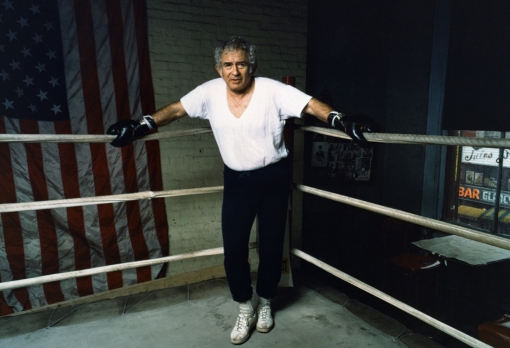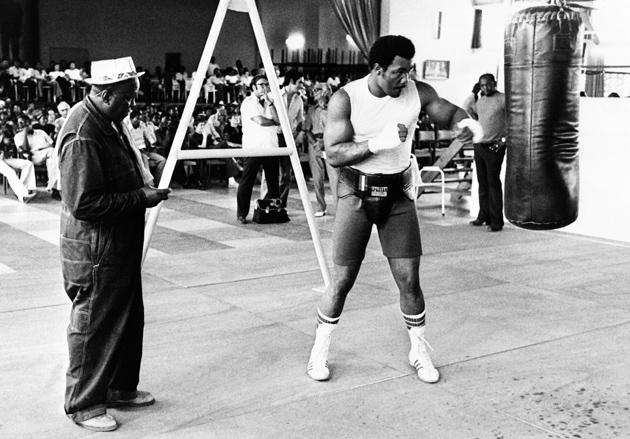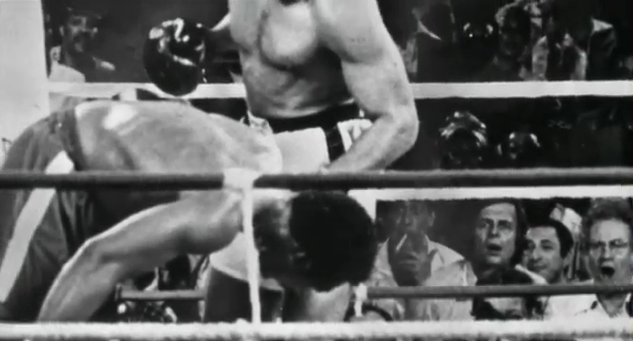On Norman Mailer
“Foreman now nodded, gave an unexpected smile, and proceeded to make his kind remark about a champ at writing.” – Norman Mailer, meeting George Foreman for the first time.
This past October we marked the fortieth anniversary of the “Rumble in the Jungle” with Rumble Week, a series of articles, interviews and reflections on Muhammad Ali’s triumph over George Foreman in Zaire. Similarly, 2015 marks the 40th anniversary for Norman Mailer’s book on that event, which comes in the same year of contemporary boxing’s most anticipated fight in decades. Floyd Mayweather vs Manny Pacquiao is ‘The Fight’ for this generation, and it’s being heralded by more puff than Ali’s clash with Foreman, which at the time was perceived by some as a mismatch. Whether, four decades from now, Manny vs Floyd will inspire the same reverence as “The Rumble in the Jungle” is what we impatiently wait to ascertain. Mailer’s book on the 1974 fight is grandiloquent, as much a tribute to the writer as it is to the event. Its ostensible topic is a boxing match, but reading it feels like watching Norman Mailer stare at himself in a mirror as he becomes increasingly aroused.
Mailer writes with the shameless self-awareness of a man standing naked in a room full of people, holding his erect dick as he smiles to acknowledge his absurdity, while doing nothing to alter his pose. He’s always most interested in the miracle of his own presence than anything else, but Mailer is not ignorant of this fact. There are so many reproaches against his own egotism in “The Fight” that you sense he’s using the Ali-Foreman clash as a tableau upon which to project, and then work through, his neuroses. These reproaches, though, are merely exposés of self-awareness: Mailer wants you to know that he knows he’s an egotist, but he doesn’t care to change because the identity fits so comfortably.

“He wrote about himself,” he states at the beginning of the book (while writing about himself). “Not only would he describe the events he saw, but his own small effect on events. This irritated critics. They spoke of ego trips and the unattractive dimensions of his narcissism. Such criticism did not hurt too much. He already had a love affair with himself, and it used up a good deal of love.” At their core, these six sentences are as vapid as they are on their surface. Mailer’s recognition of his own hubris does nothing to divest him of this hubris. He makes himself naked to create a false sense of humility, but Mailer cannot exist in the book as merely himself. Instead he must emulate the pageantry of Ali, believing that doing so brings him closer to the black athletes he idolizes.
“Black” is a word used throughout The Fight, both as a noun and an adjective. Mailer employs it abstractly, to convey an ineffable, rhythmic naturalness black people supposedly possess. It often precedes the introduction of a minor character, even when the designation isn’t necessary, and ‘blackness’ permeates his description of relations between black men.
For example, here he describes trainer Dick Sadler rubbing Foreman down after the second round of the fight with Ali: “Sadler’s touch has all the wisdom of thirty-five years of Black fingers elucidating comforts for Black flesh, sensual are his fingers as he plucks and shapes and shakes and balms, his silver bracelet shining on his Black wrist.” ‘Blackness’ is emphasized here to convey the life force that supposedly exists between Sadler and Foreman, as if the world-historical black experience has been distilled into this one mechanical act between trainer and fighter. But the passage reads more as Mailer trying hard to convey, or rather create, profundity.
Mailer is highly attuned to representations of masculinity, ideas of male sexuality, and depictions of male physicality. His writing constantly brushes up against the notion, always implicit and condescending, that blacks are physically superior beings, at once more in tune with their corporal selves and possessing deeper spiritual reserves. It seems like Mailer’s envy towards the black athletes he documents—given his obsession with questions of identity and unassuming physical stature—sprung from his will to dominate them using his brain, with literature as its medium, in a way the physical world would not allow.

The writer’s relationship with black people is rooted in simplistic notions of social and cultural identity. “But his love affair with the Black soul, a sentimental orgy at its worst, had been given a drubbing through the seasons of Black Power,” he writes near the beginning of the book. “He no longer knew whether he loved blacks or secretly disliked them.” Mailer recognizes the sentimentality of this obsession. Blacks are fine subjects for his philosophies, but their struggle for equality, which occurs outside of the box in which he’s situated them, destabilizes his ideas. And while Mailer’s aware of these projections, he repeats the practice. Later in the book he defines Don King within narrowly circumscribed and highly patronizing notions of race, King being “a genius with a hustle, one more embodiment of that organic philosophy walking in now, centuries late, from the savannah and the rain forest. The technological world, wandering along in the confusion of a rationality which had run the railroad off the tracks, might be in need of Black culture.”
Mailer does not, perhaps cannot, use the nominative pronoun ‘I’ in the book, awkwardly referring to himself as ‘Norman’, ‘Mailer’, ‘Norman Mailer’ and ‘the writer’. By using the third person rather than the first, he deliberately abstracts himself within his own narrative. In one important sense, this is a copout, because it prevents the real Norman, the ‘I’, from answering any of the provocative questions ‘Norman Mailer’ asks.
It also creates a guise of objectivity, although I’m unsure whether Mailer considered, or even cared about this. There is nothing objective about his writing. It is always the world as defined by Norman Mailer, replete with his disquisitions on sex and genius, fame and females, and the male’s will to power. His writing is so overwhelmingly subjective that perhaps there never was any intended guise. ‘Mailer’ is a way of leveraging power through his role as storyteller: he is the puppeteer who doesn’t bother to hide behind a curtain.

What sort of show does Mailer put on in The Fight? One that, despite its excessiveness, is still worth reading. There are pleasurable passages, particularly when Mailer steers his gaze to the external world. In one sense at least, Mailer presages the kind of sports writing now popularized by Bill Simmons, in which the writer has made his or herself a main character in the story. Fortunately, Mailer’s ideas are sufficiently abundant that he can write artfully about Mobutu, Don King, African spiritualism, and boxing, in a way that retains the interest of even an aggrieved reader. His theories, however maddening, blustery, and disprovable, are at least rooted in serious thought, and don’t force foolish connections between pop culture and sports. Mailer’s talent is greater and his appetite is grander: he wants to hold forth on all human life.
As always, his ambition towers, but if there’s an objective measure by which any book can be judged, it should be, “did it entertain you?” The Fight passes this test, despite the scale of Mailer’s vanity and his flatulent racial theorizing. The book is a cultural artifact that, in spite of its flaws, consistently amuses. Mailer is rarely boring and his commitment to impressing the reader is both his forte and his fault. His obsession with originality is probably why, despite (or perhaps, because of) an output that ranged from World War II to JFK and Jesus, Mailer is sometimes dismissed as a blowhard. There is logic in this criticism, because he sometimes wrote as though he wanted the reader to get down on their knees and swallow his sentences. Nevertheless, I enjoyed The Fight for its artistry and stimulative powers, the same reasons I’ve liked much of his writing. After all, reading Mailer is fun; just make sure your superego keeps a critical distance from his id.
— Eliott McCormick






Great review, Eliott. While soaked in Mailer’s sense of self-importance and despite a disturbing amount of metaphysical gibberish, The Fight remains a highly entertaining read. The scene where Mailer does roadwork with Ali after partying it up all night is a personal favourite.
Thanks Rafa. It is a highly entertaining read, and like much of Mailer’s writing I liked it. One of the hazards of book reviewing is that it’s impossible to convey all of your thoughts in a brief critique. So, while I chastised Mailer for his grandiosity and subjectivity, it’s not as if reading The Fight wasn’t enjoyable. It was. And, further to that, while I touched on his subjectivity, my review is entirely subjective, and there are many, many more enjoyable bits to extract from The Fight that I didn’t touch on. Mailer is often a cad, sometimes stupidly so, but he’s not a writer who will put you to sleep. In spite of his excess I still like the flair, and will continually return to his writing.
Elliott: You wrote: His writing constantly brushes up against the notion, always implicit and condescending, that blacks are physically superior beings, — have you ever watched the sprints in track and field? Or major basketball, professional and college?